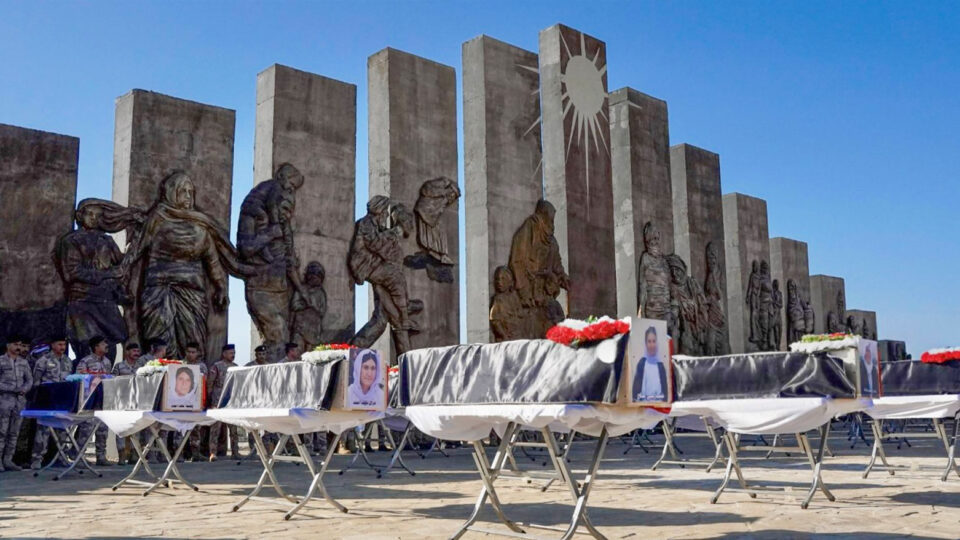Sema
The law has sparked significant controversy, with Yazidi lawmakers warning that it could open the door for the release of terrorists responsible for atrocities against various communities in Iraq.
The Iraqi Judicial Council (ICJ) has reaffirmed that individuals responsible for the kidnapping and enslavement of Yazidis and other communities will not be granted amnesty under the latest amendments to the General Amnesty Law.
However, the law has sparked significant controversy, with Yazidi lawmakers warning that it could still open the door for the release of terrorists responsible for atrocities against various communities in Iraq.
Vian Dakhil, a Kurdish Yazidi member of the Iraqi Parliament and spokesperson for the Kurdistan Democratic Party (KDP) faction in the Iraqi Parliament, voiced strong opposition to the broader scope of the amnesty law, warning that it could absolve many individuals involved in the mass killings and genocide of Yazidis.
Dakhil’s concerns were echoed by Mahma Khalil, another parliamentarian, who withdrew from the session agenda in protest, describing the law as “a grave injustice to the victims of terrorism.”
On Tuesday, Judge Ali Hussein Jaffat, head of the National Center for International Judicial Cooperation, met with Sarab Elias Barakat, Director-General of the General Directorate for Survivors’ Affairs at the Ministry of Labor and Social Affairs.
During the meeting, Jaffat emphasized that perpetrators of crimes against Yazidis, particularly those involving kidnapping and enslavement, are explicitly excluded from the General Amnesty Law No. 27 of 2016, following its most recent amendment passed by the Iraqi Parliament on Jan. 21, 2025.
The exclusion is reinforced by Article 9(First) of the Yazidi Survivors’ Law No. 8 of 2021, which states that “perpetrators of the crime of kidnapping and enslaving Yazidis shall not be granted any general or special amnesty.”
This legal provision ensures that those responsible for the horrific crimes committed against Yazidis and other vulnerable communities during ISIS’s reign of terror will face justice without the possibility of amnesty.
Broader Amnesty Law Sparks Political Divisions
While the explicit exclusion of Yazidi kidnappers from amnesty has been welcomed by many, the law remains a subject of fierce political debate.
Iraq’s Sunni political factions have been the strongest proponents of the amnesty law, advocating for a review of all convictions on terror charges, arguing that many individuals were convicted based on coerced confessions or secret informants.
The law allows for retrials of those convicted under questionable judicial proceedings, particularly cases where evidence was extracted under duress.
However, critics argue that this provision creates loopholes that could be exploited by convicted terrorists seeking release.
Collaboration for Justice and Documentation of Crimes
During the meeting, Sarab Elias Barakat expressed her gratitude for the judiciary’s continued support in addressing the legal challenges faced by Yazidi survivors.
She highlighted the importance of cooperation in documenting crimes, ensuring accountability, and providing justice for survivors of ISIS’s systematic campaign of genocide and sexual violence.
A subsequent meeting at the National Center’s headquarters brought together representatives from civil society organizations working on justice and reparations for Yazidi survivors.
Among the attendees were representatives from Yazda, Hammurabi Organization, and the Coalition for Just Reparations (C4JR).
Discussions focused on the importance of preserving evidence related to ISIS crimes, ensuring international standards in documentation, and supporting survivors in their pursuit of justice.
A Step Toward Legal Accountability
The Iraqi government has taken significant steps in recent years to prosecute ISIS members for crimes committed against Yazidis, particularly following international recognition of ISIS’s actions as genocide.
The confirmation that amnesty will not be extended to perpetrators of these crimes aligns with global efforts to hold accountable those responsible for war crimes, crimes against humanity, and genocide.
However, Yazidi lawmakers and activists remain skeptical of the government’s broader commitment to justice.
Dakhil has repeatedly criticized Baghdad for failing to implement the 2020 Sinjar Agreement, which was intended to facilitate the return of displaced Yazidis and restore security to their ancestral homeland.
She has accused the federal government of neglecting Yazidi IDPs, many of whom have lived in camps for over a decade with little support from Baghdad.
Human rights advocates and legal experts argue that ensuring justice for Yazidi survivors requires not only the exclusion of amnesty but also continued efforts in victim compensation, psychological support, and rehabilitation programs.
As Iraq navigates post-conflict recovery, the legal framework set by the Yazidi Survivors’ Law and its strict exclusion of amnesty for ISIS perpetrators represents a crucial step in addressing past atrocities.
The exclusion of war criminals from amnesty sends a clear message that Iraq is committed to upholding justice for survivors, preventing impunity, and ensuring that those responsible for heinous crimes face the full force of the law.
However, with significant political pushback and ongoing concerns over the law’s broader implications, the debate over justice and accountability in Iraq is far from over.

